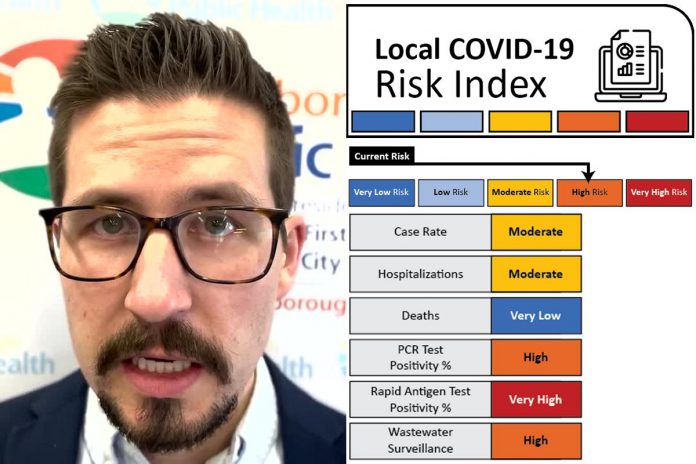
Two days after kawarthaNOW reported the Kawarthas region has the highest COVID-19 wastewater signal in Ontario, Peterborough Public Health has released local wastewater surveillance data that show the presence of the virus in wastewater exceeds the highest level seen during the omicron wave.
The wastewater surveillance data is part of the health unit’s new online COVID-19 “Community Risk Index”, which is intended to advise residents of the risk level of COVID-19 transmission in the health unit’s region and to help them make personal decisions about taking COVID-19 protective measures.
The health unit is encouraging residents to check the Community Risk Index at peterboroughpublichealth.ca/covid-19-risk-index/, as they would similar public health information such as tha Air Quality Health Index.
The Community Risk Index, which will be updated every Wednesday by 4 p.m., has five risk levels from very low risk to very high risk, and includes the status of six COVID-19 indicators used to determine the risk level: the local case incidence rate per 100,000, the number of hospitalizations, new deaths, PCR test positivity rate, community-reported rapid antigen test positivity rate, and wastewater surveillance signals.
As of March 30, the Community Risk Index is currently set a “high,” based on a moderate case rate, moderate hospitalizations, very low deaths, high PCR test positivity, very high rapid antigen test positivity, and high wastewater surveillance.
“Our goal with the COVID-19 Community Risk Index is to make our community’s virus transmission status as transparent as possible by integrating several indicators into one easy-to-understand five-point scale,” explains medical officer of health Dr. Thomas Piggott in a media release. “Each level corresponds to specific public health guidance both for the general population and for those residents who are at high-risk of serious health outcomes if they get infected.”

Seven-day rolling average of COVID-19 wastewater surveillance signal in Peterborough area for March 30, 2022. (Graphic: Peterborough Public Health)
Peterborough Public Health is one of the first health units in Ontario to produce a local COVID-19 Community Risk Index, which is still in a pilot phase and will be refined over the coming weeks. Planned enhancements will include adding more granular data in a “business intelligence dashboard,” similar to the existing Local COVID-19 Tracker, which it will eventually replace. The health unit encourages residents to provide feedback on the index.
Dr. Piggott, who says the pandemic is now entering into its sixth wave, says the current “high risk” status due to the very high rapid antigen test positivity, the high PCR testing positivity rate, and the high wastewater surveillance signal — which is equivalent to the level seen during January’s omicron surge.
“This sixth wave we are starting into, like the fifth omicron wave, will disproportionately impact those who are more vulnerable in our communities — people still unvaccinated, elderly, medically at-risk, and immunocompromised,” he explains.
With the current “high risk” status, Peterborough Public Health is recommending residents be vaccinated (with three doses for most residents and four doses for those who are immunocompromised), wear a respirator-style mask (N95 or KN95) while indoors and around others (especially if you’re at high risk), stay home if sick even with mild symptoms, get a PCR test if you are eligible, and use rapid antigen tests.
The health unit is also encouraging residents to report their rapid antigen test results, both positive and negative, by using the confidential online reporting survey at chkmkt.com/RAT21. The results of the survey are used to inform the rapid antigen test positivity rate for the Community Risk Index.
“Each of our decisions to decrease transmission today will impact the context of the pandemic in our community tomorrow,” Dr. Piggott says. “I am closely watching the concerning evolving context, considering actions to reimpose requirements as I am responsible to do under the provincial legislation, and readying to take any measures needed to protect our community and those more vulnerable in it.”
VIDEO: Peterborough Public Health Community Risk Index


























